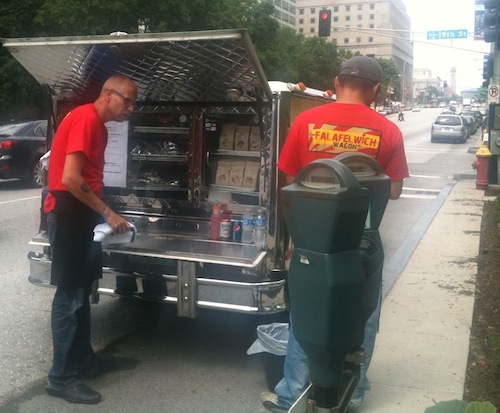Few Readers Favor Banning Food Trucks

Less than 10% of readers felt food trucks should be banned to help favor brick & mortar restaurants:
Q: St. Louis suburb of Maryland Heights just passed an ordinance regulating itinerant food vendors, including trucks; thoughts?
- Do food trucks even go out to Maryland Heights? 28 [24.78%]
- The trucks and other “itinerant” vendors should be allowed to operate anywhere 26 [23.01%]
- A uniform policy is needed for the region. 22 [19.47%]
- With 90+ municipalities in St. Louis County different regulations will be a headache for vendors 16 [14.16%]
- The trucks and other “itinerant” vendors should be banned to help brick & mortar restaurants 11 [9.73%]
- unsure/no opinion 5 [4.42%]
- Other answer… 5 [4.42%]
The “other” answers were:
- The more the better – but should park legally
- Screw Maryland Heights.
- I think you guys should worry more about crime than MH.
- there are a couple of independent ice cream vendors other than that not
- I don’t mind the food trucks that are based in the city but won’t go t
Officials act like restaurants are the only ones making capital investments and paying taxes. Food trucks, and carts, are not cheap and the work is hard. Additionally they add life to a street which attracts more people. Â More people means brick & mortar restaurants and retail stores will have more customers. Thoughts on the results?
– Steve Patterson
Personally i’m all for food trucks. Â Sometimes they’re actually the ones that have the hidden goodies.Â
Personally i’m all for food trucks. Sometimes they’re actually the ones that have the hidden goodies.
Hidden? Like e.coli
Hidden? Like e.coli
Hidden? Like e.coli
There are three kinds of food trucks, the kind that drive the same route every day and have a predictable schedule (ice cream trucks and “roach coaches” that serve places like construction sites), the kind that park in the same place every day and the “cool” ones that are unpredictable and rely on their customers using technology to “follow” them. The first kind are already well-regulated and a non-issue. The third kind are the ones that have both the least impact on existing bricks-and-mortar businesses and present the biggest potential to be a public health risk and/or not pay their local taxes – these are both issues that can be addressed with proper regulation. It’s the second kind that are most problematic for existing businesses. The best analogy is how would you feel if someone decided to park their RV / motorhome in front of your home, and just “move in”? You’d be losing “your” parking and your view, and would probably be pretty PO’ed. Plus if they’re semi-permanent, how will they deal with the inevitable solid and liquid waste when there is no infrastructure in place?
There are three kinds of food trucks, the kind that drive the same route every day and have a predictable schedule (ice cream trucks and “roach coaches” that serve places like construction sites), the kind that park in the same place every day and the “cool” ones that are unpredictable and rely on their customers using technology to “follow” them. The first kind are already well-regulated and a non-issue. The third kind are the ones that have both the least impact on existing bricks-and-mortar businesses and present the biggest potential to be a public health risk and/or not pay their local taxes – these are both issues that can be addressed with proper regulation. It’s the second kind that are most problematic for existing businesses. The best analogy is how would you feel if someone decided to park their RV / motorhome in front of your home, and just “move in”? You’d be losing “your” parking and your view, and would probably be pretty PO’ed. Plus if they’re semi-permanent, how will they deal with the inevitable solid and liquid waste when there is no infrastructure in place?